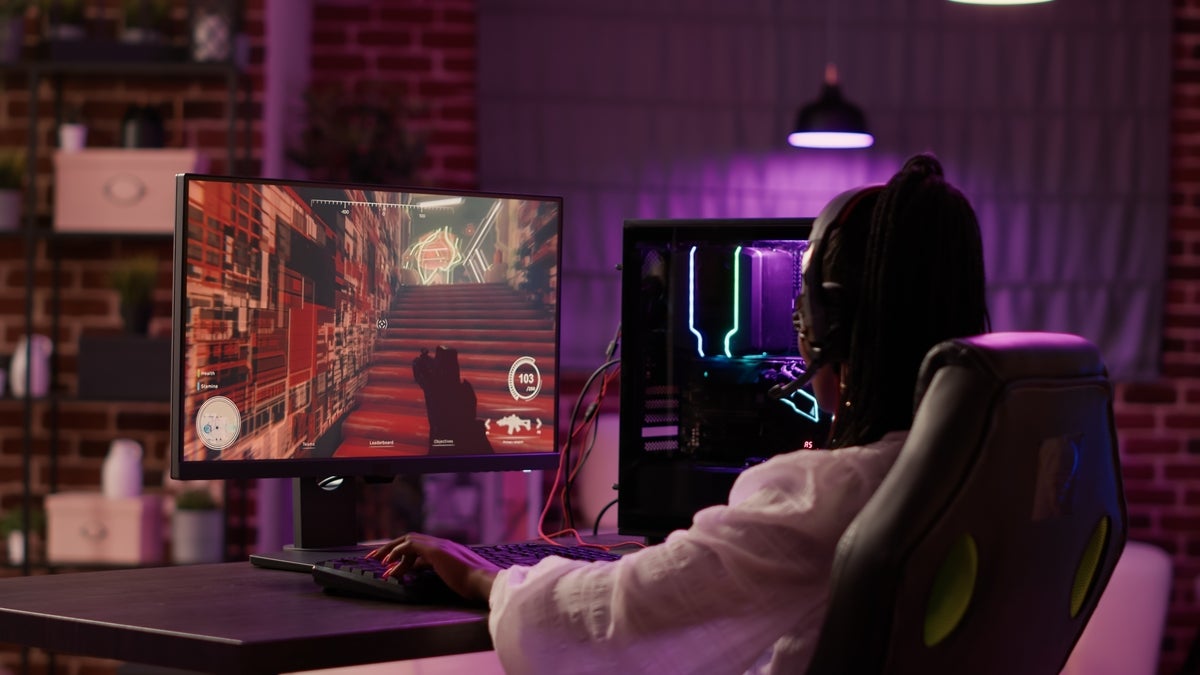Lazy slackers, nerds, basement dwellers.
Gamer stereotypes have been around nearly as long as the games they play. But the soft skills developed playing Call of Duty, Fortnite, NBA 2K and other games are now making experienced players desirable to headhunters and job recruiters.
With the overall US unemployment rate hovering around 3.5%, and the unemployment rate in the tech industry at 2.3%, employers are struggling to fill tech jobs. So they've begun looking outside traditional venues for talent — and gamers are a now a hot talent pool.
“We haven’t necessarily targeted the gaming community, but we’re talking to the gaming community through different avenues. One of our key clients is a big esports leader and I’m a gamer,” said Lavonne Monroe, HPE’s vice president of global talent acquisition and onboarding.
Skills developed through electronic-sports (esports) and gaming can translate into valuable soft skills for employers; creativity, critical thinking, reasoning, problem solving, leadership, collaboration, and resilience are all skills that can be honed through video games. Today, more than half of employers globally say they would consider gaming skills during the hiring process and 65% say they plan to consider them in the future, according to a study by global staffing firm ManpowerGroup.
Soft skills hard to train
“These soft skills are hard to find and even harder to train,” said Tomas Chamorro-Premuzic, chief talent scientist at ManpowerGroup. "Forty-three percent of employers say it’s more difficult to teach the soft skills they’re looking for. The pandemic crisis has accelerated demand for soft skills like collaboration, communication and the ability to learn, and gaming can help fill these skills gaps."
ManpowerGroup recently created a “Gaming Skills Translator” that asks job seekers to input the games they play, the amount of time they spend playing them, and their experience and skill level. The tool then spits back career skills gamers can add to their resume or talk up during a job interview.
“I do believe gaming builds a lot of skills, but it also depends on the game,” Monroe said. He likened the Gaming Skills Translator to calculators that translate military occupational specialties into skills that can be used in civilian jobs.
“They may not be able to see a direct correlation, but there is a direct correlation. I believe if there’s something that can help a gamer and/or a hiring manger make that correlation, like the MOS calculator, then that’s phenomenal,” Monroe added. “We’ve not gone down that path yet, but I’m totally game to look at it.”
In particular, ManpowerGroup’s report highlighted multiplayer games such as Fortnite and League of Legend that develop creative thinking, collaboration, and problem-solving skills.
“Gaming fosters the skill of continuous learning, and this ability to adapt one's skill set is increasingly critical as people adjust to the ever-changing landscape of work,” said Luca Giovannini, vice president of ManpowerGroup’s Global Innovation and Analytics.
The world’s 2.5 billion gamers are honing a wide variety of in-demand skills — “exactly the talent employers need to unlock a competitive advantage,” ManpowerGroup said.
The company studied more than 11,000 games across 13 genres — from action adventure to role-playing — and found the top job skills that are developed in each gaming category. It then mapped gaming skills to work skills, and identified the job families where those skills were most critical to match job recommendations.
“We have consistently made efforts to reach out to the gaming community to identify potential candidates for our roles,” said Max Levasseur, talent sourcer for veterans, diversity and hiring events at video game developer Activision Blizzard.
Activision’s gaming platforms, including World of Warcraft, Call of Duty or Overwatch, generate “Message of the Day” posts that reference hiring and open roles in a bid to reach gamers and drive awareness about the company’s job openings.
“It is important to recognize the passion and enthusiasm that lives within the gaming community, understanding that gamers grew up playing video games and have valuable knowledge and skills. To learn about our open roles, gamers can follow all of our social channels or visit our Activision Blizzard Careers page on our website regularly,” Levasseur said.
When playing Activision Blizzard’s games, users encounter complex challenges and need to strategize to overcome them; that can enhance their problem-solving abilities. Multiplayer games promote teamwork and collaboration skills through effective communication and coordination with other members of the team.
“Through gaming, you display your resilience through completing the mission or task to complete the level or level up. Gamers can also learn other skills through gaming, including becoming better writers, typers, multi-taskers, or even project management skills like [in] a Raid Leader in World of Warcraft,” Levasseur said.
Brandon Tschacher, founder of the Milwakee Esports Alliance, is familiar with ManpowerGroup’s game skills translator and believes it makes the intangible benefits of gaming tangible. In other words, “it’s connecting what you’re playing to showcasing your skills,” he said. “I was grateful they took that step.”
Bucks Gaming, the state’s only professional gaming franchise, is part of the Milwaukee Bucks organization. Participants in the group play NBA 2K, a basketball simulation game that develops collaborative skills and critical thinking.
“I grew up in the '90s. But I have four-year-old, and I really wanted him to get involved in what I figured might be his future — both in technology and ultimately gaming,” Tschacher said.
 Esports Summit/Brandon Tschacher
Esports Summit/Brandon Tschacher
Gamers involved in multiplayer esports at the ESports Summit in Milwaukee.
While Tschacher believes gaming develops soft skills, he said his group’s members often already have what it takes to work in technology fields.
Gamers often come with hard skillsets, too
“The cool thing about gaming is you have to know all of the technology to be able to play the game appropriately,” he said. “You need to know hardware, software, PC builds, you need to know software applications. Those are all parts of just being able to game. A lot of times a gamer comes out of that environment skilled enough to be able to do a variety of things.”
The professional pinnacle for many gamers is working for a game development company to be able to create the thing for which they naturally have a passion.
“The apex of that opportunity is being a developer for an AAA studio; you’re going out and you’re developing an NBA 2K, you’re making a Fortnite or one of these notable games,” Tschacher said. “And the commentary from some [gamers] is that if that doesn’t work out, you can always go work at Robert W. Baird, or one of those big corporations, and make a bunch of money. There’s always a need.”
The age of artificial intelligence (AI) will also accentuate the need for soft skills such as critical thinking, negotiation, empathy, communication, creativity, design, collaboration, and storytelling, according to Anant Agarwal, founder of online learning platform EdX.
As more mundane or repetitive tasks are tackled by automation, more complex, or hands-on, tasks will be required of workers who’ve developed various cognitive abilities.
“Many of these skills are strengthened in those who have had design and team-oriented projects in their education,” Agarwal said. “Today's gamers, particularly those playing team-oriented games, certainly develop a subset of these skills, such as quick problem-solving and teamwork. In many cases, it may be as easy, or even easier, to teach coding and AI skills to a [gamer] humanities major than to teach soft skills to a tech graduate who has yet to be exposed to activities that develop soft skills in their education.”
Activision Blizzard’s Levasseur said he looks for gaming skills in applicants. Gaming, he said, absolutely helps develop critical capabilities, and creative collaboration, communication and problem-solving are all important during the game development process.
When screening job candidates for Activision Blizzard, Levasseur looks for the ability to convey thoughts, collaborate with others and be open to feedback. He looks for applicants who have a prepared story to tell and demonstrate their communications capability. He also coaches candidates on how to reframe their skills for other jobs within the company or elsewhere.
“The ability to effectively communicate and work well with others is vital in the gaming industry, as you will be cross-collaborating with other teams and working in a fast-paced environment,” he said. “It takes every team working in harmony to deliver an incredible end product for gamers, so at Activision Blizzard, we always look for examples of these skills from applicants.
“More people than ever are gaming, and to build games that can be played by the widest possible audience, you need a team that has both hard and soft skills to make these games a success,” he added.
Outdated recruiting techniques
As many as 88% of employers are using outdated recruiting practices that filter out candidates with the right skills in favor of exact title matches or overly specific degrees, even though the research indicates it's skills, not education, that matters most, according to Betsy Summers, a principal analyst at Forrester Research.
Only 20% of employers report hiring developers without university degrees. Additionally, only one in three organizations is looking to improve the experience in their IT/technology departments by increasing access to skills development, according to Forrester Research.
Times are changing, however.
Hiring by organizations solely on skills — real-world abilities, knowledge and experience — and not just college degrees has been on the rise since the beginning of the COVID-19 pandemic. Along with remote work, there was also a correlation between the pandemic and a dramatic drop in the unemployment rate – especially in the tech industry as companies accelerated digital transformation plans.
“Gone are the days of unnecessary credentials and aspirational job requirements. Instead, employers are thinking creatively to consider different types of applicants than in the past — a shift that can benefit everyone,” job search site Indeed said in an April 2022 report.
Specifically, the Indeed survey found:
- 59% of employers are considering eliminating college degree requirements for hiring.
- 30% of employers believe removing degree requirements would help them hire more diverse talent.
- 87% of senior executives say they are not prepared to address skills gaps.
“Skills-based hiring, the practice of using skills as the primary or only way to qualify job applicants, instead of previous job title matches, degrees, or any other pedigree or affinity group, is a proven way to source more talent, especially diverse talent,” Summers said.
Josh Brenner, CEO of online jobs search marketplace Hired, referenced the company’s 2023 State of Software Engineers report, saying software engineers are prioritizing soft skills on resumes. In 2023, soft skills have become top of mind for employers hiring all software engineers, regardless of location, Brenner said.
“When asked about the top five skills engineering managers should prioritize, three on the list were soft skills-related: communication skills, leadership & team management skills, and team/product building skills,” Brenner said. “Hired started to see shifts in prioritization of soft skills, especially for but not exclusive to remote workers.”
According to Forrester Research, 78% of organizations are prioritizing internal skills development and acquisition.
Passion matters, too
“...We’re looking for the people who have the soft skills, but also the passion for gaming,” said Julie Loucks, head of Experis Games Solutions, a ManpowerGroup subsidiary that sells video game testing software. “What we’ve seen coming out of gaming community is a lot of different skills that I liken to people who’ve played team sports. Those people are out on the field competing, making decisions, having tough discussions.”
Experis, Loucks said, is “the IT section of ManpowerGroup,” which 15 years ago created the game-testing algorithms. She has seen many of her own employees move onto jobs at HPE, Amazon, and other big corporations because of soft skills such as strategic thinking they developed through gaming and game development.
Before being interviewed by Computerworld, Loucks said she reached out to a couple clients to see whether they’d been recruiting talent from the gaming community; the answer was yes.
Recruiters will often hang around the popular messaging and social platform Discord for possible job candidates or set up booths at gaming conferences.
“The perception 10 or 15 years ago was that gamers just sit on couch with a pizza next to them,” Loucks said. “But the gaming industry this year or next year will surpass $200 billion in revenue, overtaking the entertainment industry. And, several colleagues of mine picked up on that. Gaming is a viable pathway to a career there.”











